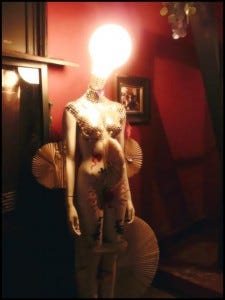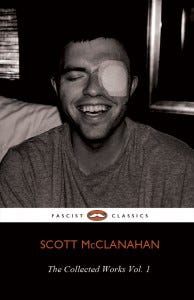essays
Letters from a Young Novelist #4: Why I Write Fiction

Since I moved back home to work on a novel, people keep asking me what my book is about. Like anyone who gets asked the same complicated question often, I have a canned answer: “It’s a fictional account of me, getting sent to a boarding school on a farm in Oregon, when I was sixteen.” If I know the person a bit better, or have reason to want to put them off/believe they won’t be put off, I will throw in that the boarding school was for “troubled youth.”
If they know something about books and publishing, they will often ask me why I’m not writing a memoir. The answer to this, too, is complicated.
The first is a practicality issue. My memory is shit. There are moments and images that I remember with perfect clarity, but there are mostly huge chunks that I have zero recollection of.
Factors that may have contributed to my shit memory:
- I have taken more psychotropic drugs than I can count.
- I have taken more recreational drugs than I can count.
- Some points in my life were really terrible, and perhaps I am saving myself from myself by not remembering them.
Because of my shit memory, I don’t think an honest portrayal of what was supposed to be my junior year in high school is possible.
But, of course, there is more to it than that. For me, fiction is more interesting than nonfiction. For me, fiction is also more difficult. It is more magical and more mysterious, and magic and mystery are two things that I have chased all my life (with results both toxic and rewarding). Mary Gaitskill once said something like this about writing: “It’s like walking on a tightrope in the dark — because you are.”
When writing nonfiction, the writer walks backward, and the tightrope they walk on is made out of time. You must

sift through the events that make up the story until you have distilled the rope down into only the pieces that are the truest and most meaningful. And while you may be surprised by what proves to be the most compelling and the most necessary, nothing that gets included on that tightrope is something you’ve never experienced before.
Fiction, on the other hand, involves walking forward along a tightrope that you’ve spun out of your own hands. On the best days, the tightrope seems to materialize out of something you didn’t even know you had been granted access to. It’s like thinking you had only nylon to work with, and suddenly realizing you’re braiding with silk.
I’m tired of this metaphor. Anyway. Nonfiction always feels like it’s coming from somewhere inside me. Fiction writing, at its best, feels like focusing my energy inward until it flows outward, and the results it yields are something that is not of me but of the world around me, something that is yes, mysterious, but also foreign and new. And so I tell the story of my junior year through fiction.
[But I must admit something, if I wish to be entirely truthful. One other reason why I don’t tell this story as a memoir is out of fear. The sixteen-year-old me is a person I pity. She was weak, terminally depressed, dramatic and self-indulgent. While I definitely do love her, I can’t say I respect or like her. And getting close enough to that girl to tell her whole story is something that both frightens and sickens me. Accessing the horrible feelings that I felt fourteen years ago that are necessary to tell this story as fiction is more than uncomfortable for me. I’d rather have the protagonist of my story be a little more understandably damaged, to have a bit of a sharper edge. I want her to be fucked up and crazy, just like the real teenaged me, but I also want her to kick quite a bit more ass.]

It gets confusing, though. I’ll spin out on a tangent to write a series of events that didn’t happen to me, and I’ll wonder if they are genuinely the details that I should write to make the best story, or if I’m merely writing them to create a distinction between Fictional Me and Actual Me. Similarly, I’ll include details and events that are as close to the truth as I remember, and I won’t know if I’m including them because it’s easier to write down what happened than it is to search for the ideas that would make up the most compelling fiction. And then I’ll realize what I’m doing, which is over-thinking, and I’ll get frustrated because over-thinking is the enemy of the first draft. Over-thinking is great for editing, but drafting should come from the gut.
I figured I should ask some of my favorite writers who write fiction about a fictionalized version of themselves for advice, and this is what they told me:
Scott McClanahan, author of The Collected Works Vol. 1 and the forthcoming Crapalachia:

Do you have any advice on writing a character who is a fictionalized version of yourself?
Stop doing it. That’s my advice. It’s only going to lead to mental illness and the loss of your family and friends. Believe me, I’ve found this out the hard way.
William Blake said: “If you who are organized by Divine Providence for spiritual communication, refuse, and bury your talent in the earth; even if you should want natural bread — sorrow and desperation pursue you through life, and after death, shame and confusion of face to eternity.”
Blake doesn’t know what the hell he’s talking about. Writers should always discourage other writers. It cuts down on the competition.
Did the fictional you do anything that surprised you, or anything that you would most certainly not do?
No, but I do stuff in my real life all of the time that I never write about. I raced a little kid the other day and I won. He was running around with his mother and she was letting him win — so I took him on. You should have seen his little face as I smoked his ass in the last 10 meters. I challenged him to a re-match and then I smoked him again. It made me feel good about myself.
I also asked the cashier at Kroger the other day if she wanted to “buy a baby.” I don’t know why I keep doing this, but I do. Say it with a straight face and you should see the looks people give you.
Brad Listi, author of Attention. Deficit. Disorder., co-author of Board, and host/creator of the Other People Podcast:

Do you have any advice on writing a character who is a fictionalized version of yourself?
Don’t be married to the facts. If you’re writing fiction, write fiction. Don’t worry too much about depicting things the way you think they actually were. Worry about telling a good, emotionally involving story about characters to whom readers can, on some level, relate. Concern yourself primarily with emotional truth, not factual truth. If you’re really worried about facts, write nonfiction. If you’re writing a novel or a story collection, give yourself permission to make shit up. Almost all of the time, things turn out better this way. Fiction is about lying in order to get at deeper truths. So lie well is what I’m saying. Lie skillfully and give yourself creative freedom.
Did the fictional you do anything that surprised you, or anything that you would most certainly not do?
I’m not sure if the ‘fictional me’ has ever really surprised me in my work. He is, after all, an extension of me and my imagination. Plus, I’m pretty hard to shock. So I wouldn’t say I’ve ever been ‘surprised.’ But the fictional me has, in many instances, done things that I myself would not do. I’m thinking in particular of the book I’m working on right now. The main character is essentiality the embodiment of all of my fear, awkwardness, insecurity, pathos, etc. He’s on a terrible losing streak, and in the story we find him making a string of bad decisions and doing some pretty stupid things. I don’t want to spoil it, but suffice it to say that he does some stuff that I would never, ever do. Or I hope I would never do. Or let’s put it this way: I haven’t done them yet. But there’s still time.
Stephen Elliott, author of Happy Baby and The Adderall Diaries, Editor-in-Chief of The Rumpus, and writer/director of About Cherry:

Do you have any advice on writing a character who is a fictionalized version of yourself?
I guess my advice would be to allow your fictional characters to transcend the truth. That’s what fiction is for.
Did the fictional you do anything that surprised you, or anything that you would most certainly not do?
All of my characters based on me do things I wouldn’t do. They get in fights. They’re less moral and more brave. I’m just a placeholder for a character that’s a lot more interesting than me. I’m a pretty boring person.
Sheila Heti, author of How Should a Person Be? and interviews editor for The Believer:

Do you have any advice on writing a character who is a fictionalized version of yourself?
Well, every character is probably a fictionalized version of yourself, in some ways. It’s just that it’s easier for some people to identify you more with certain characters than with others. I wouldn’t approach it any differently from writing any character.
Did the fictional you do anything that surprised you, or anything that you would most certainly not do?
I would never take drugs with Margaux. I was very surprised that my fictionalized version would.
In the end, I’m not sure if I learned anything new from these writers, but I can say they made me laugh, and they also made me feel that I’m on the right track. Which is, of course, invaluable. But moreover, they emphasized a powerful, compelling reason for writing fiction: Sometimes a lie, crafted well, is more honest than the truth.
PREVIOUSLY: Letter #1: Leaving the City I Love / Letter #2: I have feelings for you, Cat Marnell / Letter #3: I’m a Writer and I’m Better Than You
***
— Juliet Escoria is a writer living in Southern California. Sometimes you can find her here.









